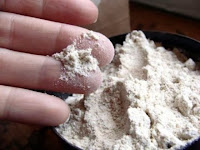Fungus gnats are tiny creatures that invade
your plants, living in the soil, getting in your coffee cup, drifting across
your computer screen. More than a nuisance, fungus gnats can harm your plants,
as the gnat larvae can feed on the roots of your plants. Their life cycle is
very short: the adults live about 10 days, but in that time can lay up to 200
eggs.
Fungus gnats are generally more noticeable in the fall and winter months.
When you bring in those houseplants that have spent the summer outside, you
bring the bugs in also; fungus gnats, as well as other insects. Repotting your
plants can also introduce fungus gnats, especially if the potting soil has a
lot of peat moss in it.
Always use a quality potting soil, when you plant or
repot your houseplants. Potting soils with moisture controls in them can make
getting rid of fungus gnats more difficult. To control fungus gnats, make sure you are not
overwatering your plants. As the days get shorter in the winter, houseplants
grow more slowly and require less water than they did in spring and summer. The
soil stays soggy longer and attracts bugs. You need to adjust your watering
accordingly. Make sure there is no standing water in the saucers under the
plants. Fungus gnats can breed here.
Some products you can use to control
fungus gnats include Yellow Sticky Traps. The adults are attracted to the color
yellow and then stick to the trap. To control the larvae in the soil, apply
products such as Food grade Diatomaceous Earth (DE).
This can be mixed
into the first few inches of soil. Any adults or larvae that come in contact
with DE will literally be sliced up. Mosquito Bits contain BTi, another
naturally occurring insecticide that can be applied to the soil surface then
watered in.
Systemic Insect Granules are another effective insecticide, when
applied to the soil surface and watered in. Both of these products effectively kill the
larvae in the soil. Insect sprays include Insecticidal Soap, Neem Oil and Permethrin.
A good time to spray is right after you water your plants. That is when you’ll
see the adults scurrying around on the surface of your plants. Fungus gnats can
be a nuisance in the fall and winter, but with the right treatment, they can be
controlled. Bring your plant questions to The Flower Bin
Diagnostic Center We’ll identify the problem and offer you the right solutions.








Processes such as Aeration, Overseeding, and Dethatching can be overwhelming for someone who has never even heard of it. Green Scene Landscaping has professionals who can do the work. Visit our website to get more info!
ReplyDelete